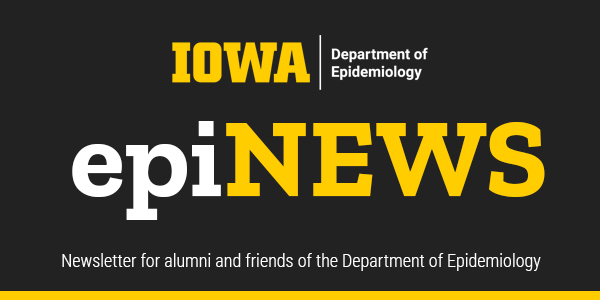|
Dear friends,
To mark two years of the COVID-19 pandemic, I am grateful for the many ways that Epidemiology faculty, staff and students enriched collegiate initiatives in the fight against COVID-19. A few examples: leading Iowa’s COVID-19 testing response, promoting return to chronic disease prevention statewide, contributing electronic health record data to nationwide systems for COVID-19 surveillance and research, providing infection control service for Hawkeye athletics, and frequently providing information to the press. Epi students have expanded the public health work force through contact tracing, pod-casting, and leading research in health disparate communities. Virtually every member of the department has contributed professionally to the fight against COVID-19.
Beyond COVID-19, faculty, staff and students have continued and refreshed their ‘regular’ work too. I hope you enjoy reading below about some of the non-COVID or COVID-adjacent happenings this past semester.
Take care and best wishes,
Betsy Chrischilles
|
Jim Torner, professor of epidemiology, was recognized by the Board of Regents, State of Iowa, for his exceptional contributions and sustained record of excellence. By-the-Numbers: 474 peer reviewed publications, 39 book chapters, $20 million dollars in external grants, 74 graduate students advised, service on 87 doctoral dissertation committees, and 25 fellows, postdocs, or K awardees. (Iowa Now)
A team of University of Iowa epidemiologistsled, by Christine Petersen, professor of epidemiology, has developed new disease surveillance strategies that couple historical data with information drawn from internet search terms to predict current trends in Lyme disease.
A new study from the University of Iowa College of Public Health, led by Paul Romitti, professor of epidemiology, suggests a possible link between selected birth defects and the use of certain types of over-the-counter cough medications by mothers early in pregnancy.
Having a sexually transmitted infection (STI) before or during pregnancy has been associated with a higher risk of giving birth too early, according to a new study co-authored by Kelli Ryckman and other College of Public Health researchers. (CNN)
Mary Charlton, associate professor of epidemiology, answered questions about improving the quality of cancer care in rural areas and an NCI grant for which she serves as principal investigator. (The ASCO Post)
Forty-one percent of U.S. adults delayed or avoided medical care — including cancer screening tests — in 2020. While the extent of the impact of this decrease in screenings is unknown, it’s possible it may have led to delayed diagnoses and increases in avoidable cancer deaths.
Featured Student Work: Anya Morozov, Radha Velamuri, and Crystal Garcia
Listen in as Anya Morozov (MPH-Epi) talks with the director of the Johnson County Public Health department about collaborating with the community to promote resiliency; learn more about Radha Velamuri's (U2G MPH-Epi) experience studying chronic stressors; see how Crystal Garcia (PhD-Epi) will use DEI grant funding to follow up with Iowans in Hispanic majority areas regarding how their health and well-being have changed during the pandemic.
Alumni Stories
The University of Iowa College of Public Health is pleased to announce two Department of Epidemiolgy Alumni are the recipients of the college’s 2022 Outstanding Alumni Awards: Brett Faine (16MS) and Kenneth Saag (93MS).
Alumna Tala Al-Rousan (15MPH) is studying hypertension management among Aramaic and Arabic-speaking refugees in San Diego.
Kaitlin Emrich (09MPH) was recently named deputy director of the Black Hawk County Health Department. She previously worked for Linn County’s health department. (The Courier)
Keep up with your classmates with our College of Public Health Alumni Directory.
Use this form to join the directory or to update your existing listing.
Alumni are listed by name, degrees earned, town of residence and email address, and have the option of adding employer, job title, employment sector and LinkedIn page.
|
|
|

